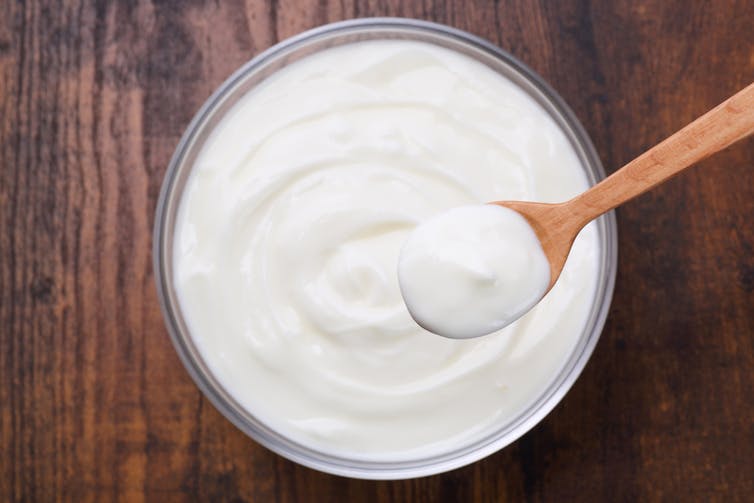Why full-fat milk is now OK if you're healthy, but reduced-fat dairy is still best if you're not
- Written by Clare Collins, Professor in Nutrition and Dietetics, University of Newcastle
The Heart Foundation now recommends full-fat milk, cheese and yoghurt or reduced-fat options as part of its updated dietary advice released yesterday.
This moves away from earlier advice that recommended only reduced-fat dairy when it comes to heart health.
So, what’s behind the latest change? And what does this mean for people with high blood pressure or existing heart disease?
What’s new if you’re healthy?
For healthy Australians, the Heart Foundation now recommends unflavoured full-fat milk, yoghurt and cheese, as well as the reduced-fat options previously recommended.
The change comes after reviewing research from systematic reviews and meta-analyses published since 2009. These pooled results come from mostly long-term observational studies.
This is where researchers assess people’s dietary patterns and follow them for many years to look at health differences between people who eat and drink a lot of dairy products and those who consume small amounts.
Researchers run these studies because it is not practical or ethical to put people on experimental diets for 20 or more years and wait to see who gets heart disease.
Read more: Are light dairy products better? We asked five experts
So when results of the recent studies were grouped together, the Heart Foundation reported no consistent relationship between full-fat or reduced-fat milk, cheese and yoghurt consumption and the risk of heart disease. The risk was neither increased nor decreased.
Put simply, for people who do not have any risk factors for heart disease, including those in the healthy weight range, choosing reduced-fat or low-fat options for milk, yoghurt and cheese does not confer extra health benefits or risks compared to choosing the higher fat options, as part of a varied healthy eating pattern.
Read more: Health Check: is cheese good for you?
Before you think about having a dairy binge, the review noted the studies on full-fat milk, yoghurt and cheese can’t be extrapolated to butter, cream, ice cream and dairy-based desserts.
This is why the Heart Foundation still doesn’t recommend those other full-fat dairy options, even if you’re currently healthy.
What about people with heart disease?
However, for people with heart disease, high blood pressure or some other conditions, the advice is different.
The review found dairy fat in butter seems to raise LDL or “bad” cholesterol levels more than full-fat milk, cheese and yogurt. And for people with raised LDL cholesterol there is a bigger increase in LDL after consuming fat from dairy products.
Read more: Got high cholesterol? Here are five foods to eat and avoid
So, for people with high blood cholesterol or existing heart disease, the Heart Foundation recommends unflavoured reduced-fat milk, yoghurt and cheese to help lower their total risk of heart disease, which is consistent with previous recommendations.
Unflavoured, reduced-fat versions are lower in total kilojoules than the full-fat options. So, this will also help lower total energy intakes, a key strategy for managing weight.
 Reduced-fat yoghurt and other dairy products are still recommended for people with high cholesterol or existing heart disease.
from www.shutterstock.com
Reduced-fat yoghurt and other dairy products are still recommended for people with high cholesterol or existing heart disease.
from www.shutterstock.com
How does this compare with other advice?
The 2013 National Health and Medical Research Council’s Dietary Guidelines for Australians recommends a variety of healthy foods from the key healthy food groups to achieve a range of measures of good health and well-being, not just heart health.
Based on evidence until 2009, the guidelines generally recommend people aged over two years mostly consume reduced-fat versions of milk, yoghurt, cheese and/or their alternatives, recognising most Australians are overweight or obese.
Read more: Plain, Greek, low-fat? How to choose a healthy yoghurt
This advice still holds for people with heart disease. However, the new Heart Foundation advice for healthy people means less emphasis is now on using reduced-fat versions, in light of more recent evidence.
The Australian Dietary Guidelines have a further recommendation to limit eating and drinking foods containing saturated fat. The guidelines recommend replacing high-fat foods which contain mainly saturated fats such as butter and cream, with foods which contain mainly polyunsaturated and monounsaturated fats such as oils, spreads, avocado, nut butters and nut pastes.
This advice is still consistent with the Heart Foundation recommendations.
Australians eat a lot of ‘junk’ food
The most recent (2011-12) National Nutrition Survey of Australians found over one-third (35%) of what we eat comes from energy-dense, nutrient-poor, discretionary foods, or, junk foods.
Poor dietary patterns are the third largest contributor to Australia’s current burden of disease. Being overweight or obese is the second largest contributor, after smoking.
If Australians followed current dietary guidelines, whether using full- or reduced-fat milk, yoghurt and cheese, the national burden of disease due to heart disease would drop by 62%, stroke by 34% and type 2 diabetes by 41%.
What’s the take home message?
See your GP for a heart health check. If you do not have heart disease and prefer full-fat milk, cheese and yoghurt then choose them, or a mix of full and reduced-fat versions.
If you have heart disease or are trying to manage your weight then choose mostly reduced-fat versions.
Focus on making healthy choices across all food groups. If you need personalised advice, ask your GP to refer you to an accredited practising dietitian.
Authors: Clare Collins, Professor in Nutrition and Dietetics, University of Newcastle



















